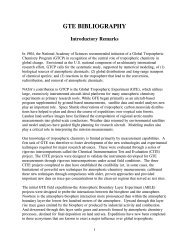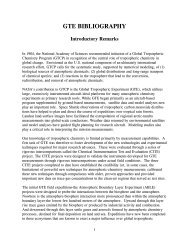NewsRelease - GTE - NASA
NewsRelease - GTE - NASA
NewsRelease - GTE - NASA
You also want an ePaper? Increase the reach of your titles
YUMPU automatically turns print PDFs into web optimized ePapers that Google loves.
Scientists from Langley, the University of Hawaii, the University of New Hampshire and the<br />
Georgia Institute of Technology are contributing instruments to the DC-8 payload for the<br />
DICE campaign. They will compare aircraft instrument measurements among each other<br />
and to observations from aerosol-monitoring ground stations located in California, including<br />
ones at Dryden, Rogers Dry Lake and Trinidad Head.<br />
DICE will enable the scientists to better understand data from past field experiments and<br />
prepare for activities in <strong>NASA</strong>'s Intercontinental Chemical Transport Experiment-North<br />
America or INTEX-NA. Scheduled for summer 2004, INTEX-NA will study the exchange of<br />
chemicals and aerosols between the land and lower atmosphere over the U.S. East Coast.<br />
"For INTEX-NA, scientists will look at the quantity of pollution over North America and how<br />
that pollution is transported across the Atlantic Ocean to Europe," Anderson said.<br />
INTEX-NA will be the latest in a series of <strong>NASA</strong> field campaigns to better understand the<br />
worldwide chemistry of the troposphere or the lower atmosphere. Over the past twenty<br />
years, <strong>NASA</strong> has conducted missions in the Amazon, the Arctic, the tropical Atlantic and the<br />
Pacific to study both natural and human-made processes that determine the troposphere's<br />
chemical makeup.<br />
The second phase of INTEX-NA is scheduled for spring 2006. This international research<br />
effort is part of <strong>NASA</strong>'s Earth Science Enterprise, dedicated to understanding and protecting<br />
our home planet.<br />
-2-<br />
-end-





